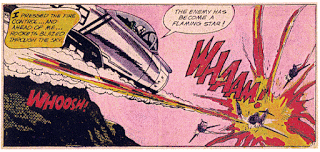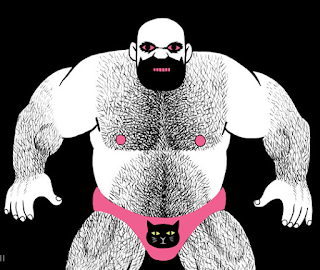Testing...
 |
| Roy Lichtenstein's Wham (1962) |
Well, here I am, starting another blog. I hate the internet and I hate airing my thoughts in a public forum, but I'll try to keep my radical feminist/anti-establishment perspective focused on the content, which is actually a subject I hold near and dear to my heart: comics and graphic novels. (I know, me excited by grad school, how shocking!) Enrolled in Wichita State University's online Advanced Studies in Graphic Novels with Dr. Darren Defrain and presenting at The International Graphic Novel and Comic Conference at the University of Dundee in Scotland, I'm psyched to spend my summer devoted solely to this genre.
So I guess I'll start off by saying what appeals to me about graphic novels and comics. Admitedly, I grew up intimidated by comics, perceiving them to be a boy thing, or a no-girl zone. I remember watching a friend's older brother go ballistic on her after we cut up a random issue of Batman for a collage. "HOW COULD YOU?!" We just didn't see what the big deal was-- he'd already read it. And it wasn't an actual book. And even if it was a book, it wasn't a very good book. Brandon Cohen, I want you to know that after two decades, I think I'm ready to apologize.
But in my defense, the comics that were popular in the early nineties were not that appealing to me. Even at a young age, the hyper-masculinity and superhero complex were just not my thing. It wasn't until late middle school, when I discovered gURL.com's collection of comics written by and for teen girls, did I begin to rethink this genre. My parents introduced me to Daniel Clowes' Ghost World when it first came out in theaters and I remember reading the graphic novel cover to cover, loving the aesthetic, and cherishing Enid, the (non-superhero) girl protagonist. Then came Dorothy Gambrell's Cat and Girl. And then came Alison Bechdel's Dykes to Watch Out For. And then I was sold and smitten.
For me, what I like best about comics and graphic novels is that they are a relatively new media. My partner, who has an MFA in visual art, will likely debate me on this statement and claim that "low culture" or "low art" has been around since-- something something. However, there is less of an established canon and thusly this genre offers better representation for traditionally marginalized voices. Adding to this, the "low culture" aspect of comics and graphic novels allow for a wider/DIY publishing platform. And, as someone who has suffered through countless classes bereft of woman, queer, poc writers in favor of "the great works," I'm ready to read (and see) the perspectives of writers who have-- and continue to be-- kept out of the academic conversation.
And so, here we go, these are the following texts I will be covering in this course.
- The Visual Language of Comics: Introduction to the Structure and Cognition of Sequential Images by Neil Cohn
- Comics and Language: Reimagining Critical Discourse on the Form by Hannah Miodrag
- The Walking Dead by Robert Kirkman
- Patience by Daniel Clowes
- High Soft Lisp by Gilbert Hernandez
- The Love Bunglers by Jaimie Hernandez
- Hey Wait… by Jason
- One Hundred Demons! By Linda Berry
- Special Exits by Joyce Farmer
Additionally, my friend and comic book writer, Alex Smith (the ultimate authority of knowledge on comic books and graphic novels written by diverse authors), gave me this list of feminist/queer texts to explore on my own.
- Bitch Planet by Kelly Sue DeConnick (yup, where I got this blog's title!)
- Rat Queens by Kurtis J. Wiebe
- Nimona by Noelle Stevenson
- Lumberjanes by Noelle Stevenson, Grace Ellis, Shannon Watters, Faith Erin Hicks
- Princeless by M. Goodwin
- Alters by Paul Jenkins
- The Young Avengers by Allen Heinberg and Jim Cheung
- Monstress by Marjorie Liu
I will be writing critically on queer themes and gender identity in YA graphic novels, specifically the following texts.
- Honor Girl by Maggie Thrash
- Drama by Raina Telgemeier
- Tomboy by Liz Prince
Finally, the last thing I want to do with this blog is to highlight some of the people I know who write and draw comics. It's great reading Bechdel and Clowes, but there's a real punk element to comics that I think draws a lot of us in.
 |
| A comic my bestie drew of my Philly phamily destroying Gaga's Bad Romance ala Karaoke. |
till next time,
-Jesse

Comments
Post a Comment